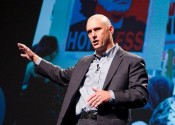NEW – BILL McKIBBEN, Founder 350.org, New Book, FALTER: Has the Human Game Begun to Play Itself NEW – BILL McKIBBEN, founder 350.org, new book, FALTER: Has the Human Game Begun to Play Itself Out?
Written on April 17th, 2019Thirty years ago, BILL McKIBBEN’s THE END of NATURE was the first popular book about climate change. Since then the effects have exceeded our expectations, while our response has lagged what’s needed. Bill has done his part – with books, articles, and as co-founder of the climate movement 350.org, which has held 20,000 rallies in 182 countries and spearheaded the fight against the XL pipeline and the movement to divest from fossil fuel companies. We talk about the latest findings, warnings, and global activism in his new book FALTER: Has the Human Game Begun to Play Itself Out? www.billmckibben.com
Free Forum Q&A – TIM DECHRISTOPHER: Civil disobedience (bidding) at public lands auction landed him 21 months in prison
Written on May 25th, 2014 |
Aired: 6/30/13
On December 19, 2008 TIM DeCHRISTOPHER disrupted a highly disputed BLM auction, effectively safeguarding thousands of acres of land. Not content to merely protest outside, Tim entered the auction hall and registered as bidder #70. He outbid industry giants on land parcels (which, starting at $2 an acre, were adjacent to national treasures like Canyonlands National Park), winning 22,000 acres of land worth $1.7 million Two months later, incoming Interior Secretary Ken Salazar invalidated the auction. Yet DeChristopher was indicted and tried on two federal felonies and spent 21 months in prison.
Released in April 2013, DeChristopher is the subject of documentary film, Bidder 70, which opened this weekend at the Music Hall in Beverly Hills and other theaters around the country. He joins me this week to tell his story. What led him to that auction? What went through his mind as he began bidding and winning? Why didn’t he take a plea deal? What was his experience in prison? What message does he have for others?
We’ll also talk about the state of the movements to deal with energy, environment, and climate change, in light of Obama’s recent speech and the eventual decision whether or not to build the KeystoneXL pipeline.
“At this point of unimaginable threats on the horizon, this is what hope looks like. In these times of a morally bankrupt government that has sold out its principles, this is what patriotism looks like. With countless lives on the line, this is what love looks like, and it will only grow…
— From Tim DeChristopher’s statement to the court at his sentencing hearing
Q&A: Mark Mykleby, Natl Security=Sustainability
Written on April 8th, 2013 |
Aired: 04/07/13
In the preface to an article entitled A National Strategic Narrative, Anne-Marie Slaughter of Princeton says we need a narrative that confronts some of the following questions, “Where is the United States going in the world? How can we get there? What are the guiding stars that will illuminate the path along the way? We need a story with a beginning, middle, and projected happy ending that will transcend our political divisions, orient us as a nation, and give us both a common direction and the confidence and commitment to get to our destination.” She also writes, “In one sentence, the strategic narrative of the United States in the 21st century is that we want to become the strongest competitor and most influential player in a deeply inter-connected global system, which requires that we invest less in defense and more in sustainable prosperity and the tools of effective global engagement.”
Over time, the best way to shape the force of the future is to invest in the science, technology, education, and training that will equip our soldiers, sailors, airmen, and marines to adapt to an increasingly complex and dynamic environment. The hardware and software we buy and build are secondary to the gray matter we must cultivate now.
When I hear that someone high up in the military is talking seriously about sustainability, I take notice.
www.newamerica.net
Q&A: VANDANA SHIVA, Physicist, Ecologist, Activist, Editor, & Author
Written on December 27th, 2010 |
Aired 12/26/10
Dr. Vandana Shiva is a physicist, ecologist, activist, editor, and author of many books. In India she has established Navdanya, a movement for biodiversity conservation and farmers` rights. She directs the Research Foundation for Science, Technology and Natural Resource Policy. Her books include Biopiracy: The Plunder of Nature and Knowledge, Stolen Harvest: The Hijacking of the Global Food Supply, and her newest, Soil Not Oil: Environmental Justice in an Age of Climate Crisis. Shiva has been awarded several awards for her efforts including the Right Livelihood Award and the United Nations Environment Program [UNEP] Global 500 Award in 1993, and most recently the 2010 City of Sydney Peace Prize.
Q&A: John Warner/Paul Anastas – founders Green Chemistry and co-authors of Green Chemistry
Written on November 23rd, 2010 |
Aired 11/21/10
JOHN WARNER and Paul Anastas are the founders of green chemistry and co-authors of Green Chemistry: Theory and Practice, in which, they establish 12 guiding principles for chemists. In 1996 Warner left a lucrative job at Polaroid to found the nation's first doctoral program in green chemistry, and in 2007 he founded Warner Babcock Institute for Green Chemistry, an innovation incubator, in Wilmington, Mass.
Green Chemistry is a revolutionary approach to the way that products are made; it is a science that aims to reduce or eliminate the use and/or generation of hazardous substances in the design phase of materials development. It requires an inventive and interdisciplinary view of material and product design. Green Chemistry follows the principle that it is better to consider waste prevention options during the design and development phase than to dispose or treat waste after a process or material has been developed.
